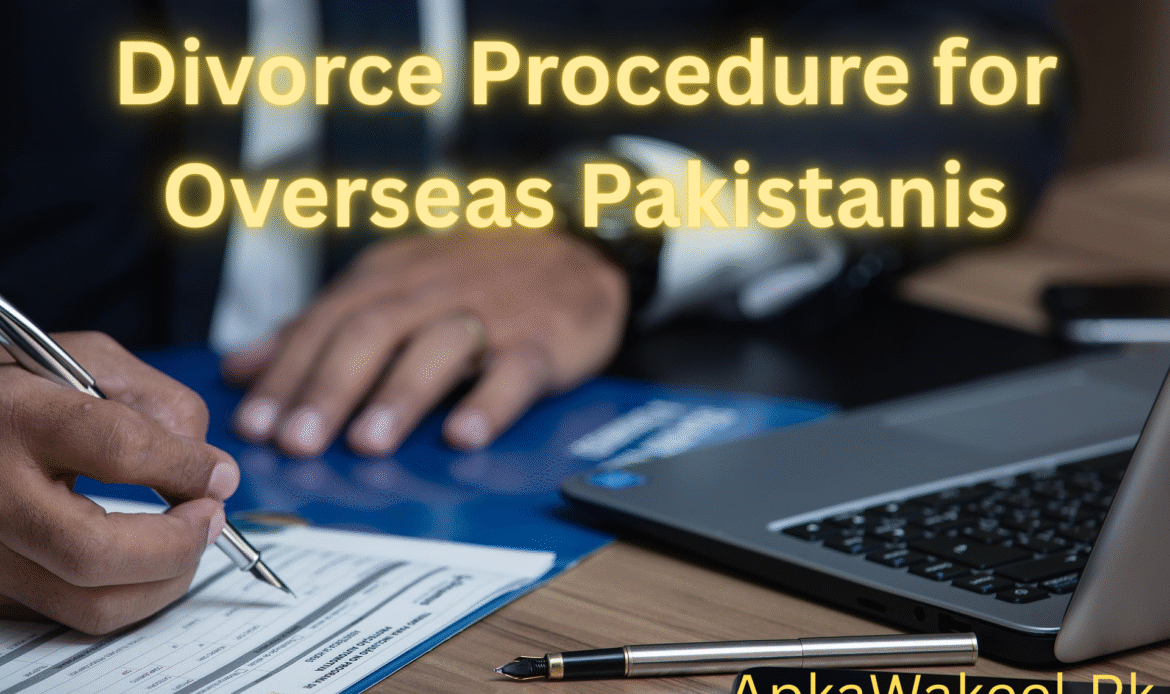Divorce for overseas Pakistanis is governed by Islamic law and the Family Courts Act of 1964. Overseas Pakistanis can go through the divorce process even if they live abroad. Here’s a simple guide to help you understand the Divorce Procedure for Overseas Pakistanis..
Divorce Types in Pakistan
In Pakistan, divorce can occur in two ways:
- Khula: A wife seeks divorce from her husband.
- Talaq: A husband initiates divorce by pronouncing “Talaq” three times.
Both Khula and Talaq are based on Islamic law and the Family Courts Act, 1964, which provides the legal framework for divorce cases in Pakistan.
Filing for Divorce from Abroad
If you’re living abroad, you can still file for divorce in Pakistan. The process can be handled by a lawyer in Pakistan. By signing a power of attorney (PoA), you allow your lawyer to represent you in court and manage the divorce process on your behalf.
Grounds for Divorce / Khula
The common grounds for divorce in Pakistan include:
- Irretrievable breakdown of marriage.
- Cruelty (both physical and emotional abuse).
- Incompatibility between the spouses.
- Failure to provide maintenance.
These grounds are applicable whether you are in Pakistan or living abroad. The court considers these reasons when reviewing a divorce case.
Khula: Wife’s Right to Divorce
In Pakistan, a wife can file for Khula if she wants to end her marriage. Khula can be sought without the husband’s consent, but the wife must return the Haq Mehr (dower) or any gifts received during the marriage. If you’re an overseas Pakistani woman, you can apply for Khula through a lawyer in Pakistan.
Talaq: Husband’s Right to Divorce
A husband can initiate divorce by pronouncing Talaq three times. This process is also governed by the Family Courts Act of 1964. Even if you’re living abroad, you can begin the process of Talaq by sending the necessary documents to your lawyer in Pakistan, who will handle the proceedings for you.
Court Procedure for Divorce
The Family Court in Pakistan handles divorce cases. Here’s how the court process generally works:
- Step 1: The lawyer files the divorce application in the Family Court on behalf of the client.
- Step 2: The court sends a notice to the other party to inform them of the divorce petition.
- Step 3: The court may attempt to reconcile the couple. If reconciliation fails, the case moves forward.
- Step 4: The court issues a divorce decree after considering the case details.
- Step 5: The divorce is finalized after the iddah period, which is typically a three-month waiting period to ensure the wife is not pregnant.
Rights After Divorce
Both parties have specific rights after the divorce:
- The wife is entitled to maintenance during the iddah period.
- The court will decide on child custody if the couple has children.
If you live abroad, your lawyer in Pakistan can assist in ensuring that maintenance and custody rights are enforced.
Conclusion
Divorce Procedure for Overseas Pakistanis may seem complex, but with the right legal guidance, the process can be managed effectively. Whether you are seeking Khula or Talaq, understanding the process and relevant laws is essential. At ApkaWakeel our best Family Lawyers in Lahore to help overseas Pakistanis with divorce cases, ensuring that your rights are protected throughout the process.


